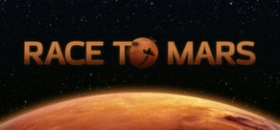
Race to Mars Preview
Steam’s Early Access section has enjoyed a highly successful first year. The release of a slew of top-sellers such as Rust, Starbound, Kerbal Space Program and DayZ in such a short space of time has cemented the process as a mainstay for Indie developers looking to earn a bit of cash, attention and feedback before the full release of their game. However, despite the sales figures and the 140-strong titles already using the system, Early Access is not without its naysayers.
If you happen to be one of these disputers, somebody who thinks Early Access is simply a way for developers to publish broken or unfinished games for a bit of quick income, while giving them the opportunity to languish in the development stages and break promises that have already been paid for, Race to Mars is the type of game you might use as an example.
Available at the time of writing for £14.99, Race to Mars currently offers the intrepid purchaser roughly an hour of inconsistent gameplay. Of the 20-something buildings I constructed for my space facility, only a handful could be interacted with, the rest displaying an identical message that implied their implementation later in development. Of the buildings I could use, one was yet to be translated from Polish into English.

The language issue is present throughout the game. Press conferences present you with an opportunity to raise your company’s reputation by answering questions on your ambition, the environment, finances, politics and all sorts. There’s no easy categorisation of the topics, making it feel as though some background knowledge of such matters is required in order to judge competently. The task is made even harder by the broken English used, effectively scrambling the point at hand.
It’s a frustrating game to play - one that draws you in with its potential, only to keep stabbing itself in the foot as you are made to muse on what it might be like a year from now. The topic of space exploration is gratifying, and the tone and music of the game do well to capture an emotive aspect of what is humankind’s highest ambition. Being pointed in the direction of Mars and given the chance to replicate the original Space Race is indeed seductive. Unfortunately, the game just isn’t fun enough to hold up this initial enticement.
The menus are confusing to navigate and little is offered in terms of guidance, making it feel as though you have been thrown into the deep end of what might be a challenging and in-depth simulation game. This would be fine if there were time to get to grips and immerse yourself in the layout, but your ambition and sense of progress are dampened a little bit more each time you access a new part of the game, only to realise you don’t have access to it. It soon becomes abundantly clear that you won’t be reaching Mars in this version of the game.

Engineers can be recruited and set to task building things such as satellites or fuel types, which is where your first element of choice comes into play. The research tree is fairly large, and it can take years to build something (literally - a month passes each turn). This at least lends some importance and urgency to your decisions, only this will likely be muted by the probability that you don’t know the difference between Awionic and Thruster systems, or the benefits of using Hydrocarbons over Hypergolics when it comes to rocket propulsion. You’re offered no breakdown; there are no stats to compare.
Therein lies the main issue with Race to Mars - for a game which employs such a strong theme of ambition, there is no real sense of direction, no long-term goal in sight, no chance to carve your own path. You’re sent stumbling through a monotony of constructing buildings, attending press conferences, recruiting engineers and sending them to work without any coherent feeling of progress or consequence. No explanation is offered as to how anything you do will help you reach Mars.
There’s not much on offer, and what is will likely confuse and/or bore you. The game is not without potential - if only because it applies an engaging theme and is so far from being finished that it could be a completely different game by the time it reaches a full release. Developer INTERMARUM has much to do, and at the state it’s currently in, Race to Mars isn’t worth anybody’s time or money.









COMMENTS